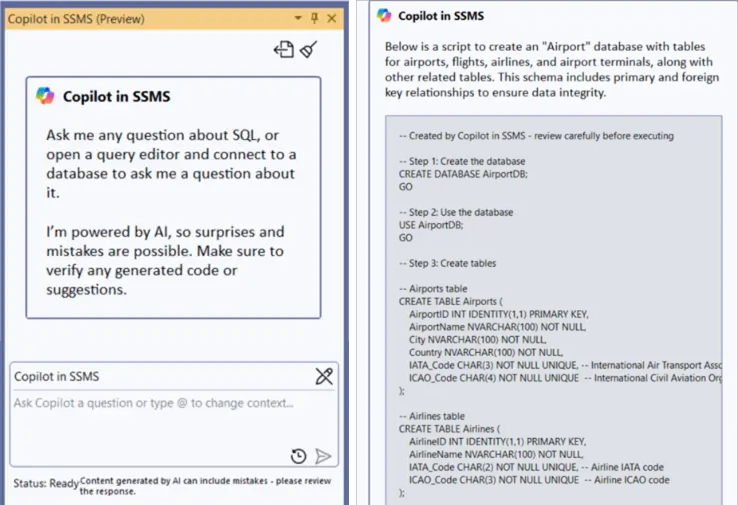Imagine having an intelligent assistant embedded in your SQL Server Management Studio (SSMS) that anticipates your needs, offers coding shortcuts, and streamlines your workflow.
With the integration of Copilot in SSMS 21, this vision is now a reality for database professionals. Copilot harnesses AI to boost productivity and simplify daily tasks, making advanced SQL development and management more accessible than ever.
Easy Setup with Azure OpenAI
Getting started with Copilot in SSMS 21 is surprisingly simple. All you need is an Azure OpenAI subscription to unlock AI-powered features.
You’ll set up your Azure resource, obtain the endpoint URL, deployment name, and API key, and then plug these details into the Copilot configuration pane within SSMS. While Copilot itself is free, be mindful that Azure’s AI services may generate additional charges.
- Deploy an Azure OpenAI resource (only gpt-4o is supported currently).
- Enter your endpoint and API key in the SSMS Copilot setup.
- Your queries remain private, leveraging a retrieval augmented generation (RAG) process that ensures confidentiality and security.
Smarter SQL Development
Once enabled, Copilot introduces a dedicated chat pane where you can request anything from basic database creation to intricate query generation. For example, you might ask Copilot to build an airport database, and within seconds, it generates a comprehensive set of DDL scripts for tables, relationships, and indexes.
- Copilot provides scripts for review and manual execution, maintaining transparency about their accuracy.
- It explains its logic and can proactively suggest supporting tables or enhancements you didn’t specify.
- You can easily insert or copy code snippets into the SSMS query editor for further customization.
Effortless Data Management
Copilot’s capabilities go beyond scripting tables. Request sample data, and it generates relevant INSERT statements. For operational tasks like backups, Copilot walks you through the process and scripts SQL Agent jobs for automated scheduling.
- Review generated sample data for suitability—it may mix real and fictional entries.
- Backup scripts are robust but may require clarifying your scheduling needs.
- Step-by-step guides help you follow up on recommendations, such as configuring agent jobs.
Advanced Queries and Best Practices
Need help with complex procedures or reporting? Copilot can create stored procedures, adapt queries, and offer best practice recommendations on security, indexing, and maintenance.
While it won’t run diagnostics or interpret results, it hands you scripts to execute and provides actionable advice based on your input. Copilot encourages user feedback, allowing you to rate suggestions and help shape future improvements.
Session Management and Flexibility
All interactions with Copilot can be exported as Markdown files, making it simple to track conversations and share code with colleagues. If you decide Copilot isn’t a fit, uninstalling is as easy as deselecting the AI Assistance option in the Visual Studio Installer.
Key Takeaways
Copilot transforms SSMS by making script creation, database management, and SQL best practices more conversational and efficient. While it accelerates routine and advanced tasks, always review AI-generated outputs for accuracy. Copilot isn’t just a convenience—it’s a capable partner for modern SQL Server professionals.
Source:MSSQLTips.com


Transforming SQL Server Management Studio Workflows: Copilot Integration Explained